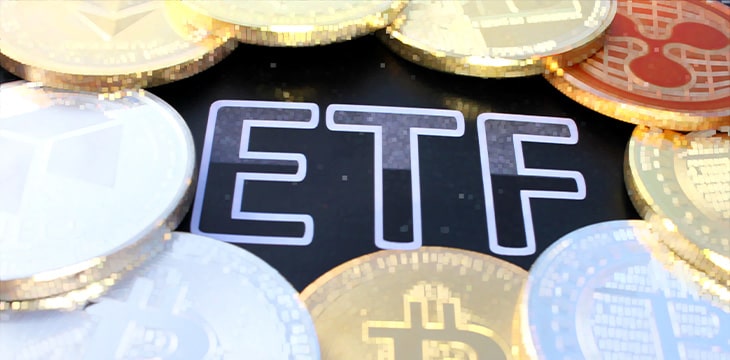|
Getting your Trinity Audio player ready...
|
A digital currency ETF was finally approved in the United States. For years, various companies have tried to get digital currency-related ETFs listed on a U.S. stock exchange, but they have been rejected by the SEC each time. That changed on September 15, 2022, when HashDEX’s Bitcoin Futures ETF ($DEFI) was listed on the New York stock exchange.
The listing made me wonder why Hashdex’s ETF seemed to get approved without obstacle while the other digital currency ETFs that have come across the SEC’s desk continually get denied. To learn more, I spoke with Hashdex co-founder Bruno Sousa to understand how $DEFI got listed while other ETFs struggled and how he and his team at Hashdex are seeing investors strategize around the ongoing bear market.
Futures vs Spot
To date, many companies have tried to get a spot BTC ETF approved, but HashDex took a different approach by creating a bitcoin futures ETF. ($DEFI)
“Generally speaking, spot markets are characterized by the immediate delivery of the traded asset (commodities, currencies, stocks, and bonds), while futures markets settle the delivery of the traded underlying asset on a predefined future date,” said Sousa.
“In practical terms for the bitcoin space, under the existing market infrastructure, a spot BTC ETF would provide exposure to BTC by acquiring the asset in crypto exchanges. The futures products, either under the ’33 Act or ’40 Act framework, invest in BTC futures contracts and other derivatives. These instruments are based on the price of BTC and are traded in the Chicago Mercantile Exchange Inc. (CME). By approving BTC futures products, the SEC understands that it provides an additional protection layer to investors since the exposure to BTC is provided through futures contracts negotiated in the Chicago Mercantile Exchange Inc. (CME), which is CFTC-registered and regulated,” he added.
Unlike spot digital currency investment vehicles, futures products have very clear regulatory oversight and reporting requirements. On the other hand, the SEC has repeatedly denied spot digital currency ETFs citing market manipulation and the lack of a surveillance-sharing agreement between a “regulated market of significant size” and a regulated exchange as two of the main raises for rejection.
“Although (i) crypto exchanges fall under the regulatory scope of the Bank Secrecy Act (BSA) (this means they must be registered to FinCEN, implement AML/CFT programs, maintain appropriate records, provide reports to authorities, etc), and (ii) the SEC has the prerogative to apply securities laws comprehensively; the SEC’s position signals it may require more regulatory oversight of crypto exchanges before approving a spot bitcoin ETF,” said Sousa.
Who buys in Bitcoin bear market?
So who’s buying digital currency ETFs? One reason investors, speculators, and blockchain enthusiasts are attracted to the blockchain and digital asset space is because many coins and tokens are volatile in a way that allows them to experience significant gains (and losses) in wealth.
However, due to a lack of regulation in the spot market, not all accredited investors, especially those who represent or invest on behalf of financial institutions, have the freedom to invest directly in digital assets. Instead, they rely on registered, regulated vehicles, like ETFs, to track the performance of an asset or a basket of assets instead of investing directly into an asset. Hashdex says that their first ETF product in 2021 allowed many investors to allocate to digital currency for the very first time, and now, over 250,000 investors around the globe hold shares of $DEFI.
But regardless of a digital currency ETF being listed on the NYSE, most market participants, economists, financiers, and bankers would tell you that it is an objectively bad time to have exposure to digital assets.
“The current macro conditions are very challenging. Uncertainty makes investors avoid making long-term capital commitments. Once investors start seeing some light at the end of the tunnel, especially with regard to the reduction of inflation numbers worldwide which could point to the end of this tightening cycle, investors will eventually consider adding risk assets to their portfolios—including crypto. At the end of the day, it all comes down to investors perceiving a clearer outlook for the future, making them more comfortable to review their positions to risk-on,” said Sousa.
“We believe crypto is a long-term play, and as such, allocations should be made responsibly—with small allocations—and continuously. This avoids timing the market and suffering huge drawdowns and allows investors to consistently build positions in one of the most promising technologies being developed today,” he added.
Sousa’s insight is in line with the old adage investors often use “it’s not your time to the market; it’s your time in the market.” Meaning that the lower your time preference is, the more likely you are to experience a positive outcome since you are not operating within a small window in which you would like the market to move in a particular direction. To date, this strategy has been beneficial for many digital assets, with the top two digital assets by market cap being up roughly 300% in value over the last five years.
Digital currency correlation
Despite the successful buy-and-hold strategy, some of the latest macroeconomic developments have proved that the digital asset market(s) are highly correlated with the Nasdaq and the S&P 500. Coins and tokens that were once touted as being hedges against inflation and good diversification tools for individuals with a portfolio that largely contained equities, turned out to be high-beta versions of the same markets they were meant to diversify against.
BTC and Nasdaq are roughly in-line with each other, beta-adjusted, since the start of the year
(BTC moves ~2x as much in general)
— SBF (@SBF_FTX) October 10, 2022
“It is important to highlight that correlation are highly dependent on the time frame you choose to calculate them. Lately, as global markets are in extreme risk-off mode, with persistent inflation in developed markets, supply chain issues still caused by Covid and the conflict in Ukraine, the correlation between digital assets and the S&P 500 and Nasdaq has been very high. We expect it to remain high as long as these risks continue on investors’ relevant investment horizon,” said Sousa.
“However, we believe the digital asset space possesses some characteristics that will likely make this asset class much less correlated to the S&P 500 or the Nasdaq (for instance) in the long run: (i) blockchains are digital networks, and digital networks tend to grow exponentially, (ii) the current stage of technological developments in this space, (iii) multi-billion investments in infrastructure, product and user experience in recent years coming from VC firms, (iv) increased global adoption of the technology by regulators, financial institutions, companies and retail investors in general. If this trend continues, we expect that crypto and blockchain technology in general will become very uncorrelated to other asset classes,” he said.
In summary…
The HashDEX Bitcoin futures ETF $DEFI was approved by the SEC because it tracks BTC futures rather than the spot market. Futures markets are highly regulated and fall under the CFTC’s jurisdiction. Spot ETFs are repeatedly rejected by the SEC because the spot market for digital assets is highly unregulated, among several other concerns the agency has, such as market manipulation.
But even with the digital-asset-related ETF on the market, investors have been reluctant to shovel money into digital assets. The global macroeconomic conditions have created a poor environment for risk assets, and many investors are avoiding investing in risk assets until the financial forecast clears up. Currently, there is no sign of when that will occur. However, the team at HashDex believes that the macro-environment is not necessarily as significant as people think. They argue that most digital asset investments are a long-term play and that on a long enough time horizon, the economic conditions that are confining cash flow into the digital asset market will be made up for by market performance when market conditions begin to ebb and flow once again.
Watch: The BSV Global Blockchain Convention panel, Tokenizing Assets & Securities on Blockchain

 02-19-2026
02-19-2026 




